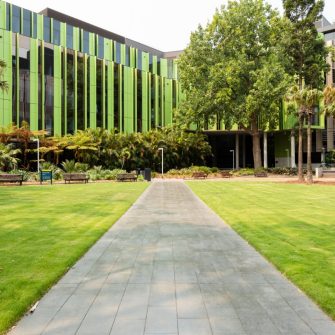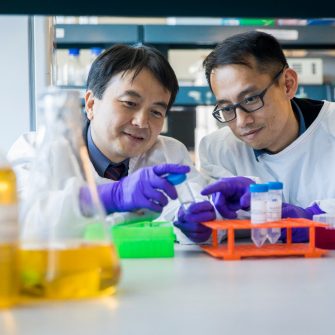Graduate Certificate in Health Data Science
- Commencing Terms
- Term 1 & 3
- Duration
- 0.7 Year(s)
- Delivery Mode
- Face-to-face (includes blended), Online
- Campus
-
Kensington
- Codes
- Program code 7372
- CRICOS code 096227J
-
Commonwealth Supported Places are available for this program2026 Indicative CSP first year fee
- $5,000*
-
2026 Indicative CSP fee to complete degree
- $5,000*
-
2026 Indicative first year full fee
- $26,000*
-
2026 Indicative full fee to complete degree
- $26,500*

Application closures for 2026
Undergraduate programs for 2026 intakes are closed for New Overseas Student Commencement (NOSC) applications. Applications for postgraduate programs remain open. Find out if this closure applies to you.
- Overview
- Entry requirements
- What will I study?
- Future careers
- How to apply
- Fees & Scholarships
Overview
Health Data Science (HDS) is the science and art of generating data-driven solutions through comprehension of complex real-world health problems, employing critical thinking and analytics to derive knowledge from big data. HDS is an emergent discipline, arising at the intersection of biostatistics, computer science, and health.
The Graduate Certificate in Health Data Science covers the first part of the HDS pipeline concerned with comprehension of health context, statistical foundations, principles of programming, and data wrangling and management. Graduates can embark on further study in the Graduate Diploma or Master of Science in Health Data Science.
Key features
- Industry relevant program
We designed this program in response to a significant and growing gap in the global health workforce: skilled data scientists who understand the context of health and can apply data analytics to drive health improvement. In this program, you’ll be exposed to real-world problems and learn the latest analytical methodologies to derive solutions.
- Suited to a wide range of backgrounds
This program is suitable for students who are starting out in the field and those already working within it who want to upskill. Whether you’re a statistician who wants to build on your current skills, a clinician or nurse who wants to improve the quality of care received by your patients, or a keen programmer looking to convert your on-the-job experience into a formal qualification, this program welcomes students from a wide range of backgrounds.
- Flexible delivery
This program can be completed full-time or part-time, on-campus or fully online. Content is delivered through a combination of online readings, expert guest lectures and practical hands-on tutorials. Lectures are followed by exercises, which reinforce the learning and programming skills covered in the tutorials.
Why study at UNSW?
Study the first postgraduate program in health data science
Our master’s degree, graduate diploma and graduate certificate in health data science are pioneering programs that examine data-driven solutions to complex health problems. UNSW's Medicine & Health faculty is ranked #54 globally for life sciences and medicine (QS World University Rankings by Subject, 2025) and we’re leading this new approach to healthcare.
Learn within a world-leading research and teaching institute
This program is delivered by the Centre for Big Data Research in Health (CBDRH) – the leading Australian and international hub for health research using big data. The CBDRH brings together an interdisciplinary team of staff, who have world-leading expertise in managing, manipulating, analysing and visualising health big data. Using large-scale electronic data than spans the biomedical, clinical and health services domains, the CBDRH is transforming knowledge from data into practical applications within health.
Connect with staff and students in a dynamic learning environment
In some courses, a flipped classroom approach is used, where you’ll learn theory from short online videos and use face-to-face or online sessions to apply knowledge, practice skills and engage in peer-to-peer learning. A major feature of our student-centric learning experience is the online community, where you can interact with your peers and instructors from diverse backgrounds and workplaces.
Want to see more from UNSW Medicine and Health?
Entry requirements
For entry into this degree, you must have one of the following:
- An undergraduate degree in a cognate discipline
- An undergraduate degree in a non-cognate discipline at honours level
- An undergraduate degree in a non-cognate discipline and minimum one year (full-time) relevant work experience
- Minimum three years (full-time) relevant work experience
Cognate disciplines
- Medicine
- Nursing
- Dentistry
- Physiotherapy
- Optometry
- Biomedical/biological science
- Pharmacy
- Public health
- Veterinary science
- Biology
- Biochemistry
- Statistics
- Mathematical sciences
- Computer science
- Psychology
- (Health) economics
- Data science
- Other (case-by-case basis)
Relevant experience is defined as:
- Any (professional) position involving data acquisition, management or handling (e.g. database manager)or
- Any (professional) position involving analytics (e.g. data analyst) and *tertiary-level training, demonstrating capability in a cognate discipline
- Exhibits potential to pursue postgraduate (level 8) studies
Evidence requirements will be a CV and an employer provided statement of service in relation to professional experience.
Recognition of prior learning (RPL) is awarded in accordance with UNSW 'Recognition of Prior Learning (Coursework Programs) Policy' and 'Recognition of Prior Learning Procedure', for both program admission and credit.
Criteria for RPL for admission is detailed in the program entry requirements.
English language requirements
You may be asked to provide evidence of your English proficiency to study at UNSW depending on your educational background and citizenship. English language skills are vitally important for coping with lectures, tutorials, assignments and examinations - this is why UNSW requires a minimum English language competency for enrolment.
If you’re completing an Australian Year 12 qualification (e.g. NSW HSC or equivalent), you do not need to provide anything extra to prove your proficiency. Your qualification will be used as evidence of your English proficiency.
If you do need to provide evidence of your English proficiency, this will be indicated in your application. You can prove this by providing evidence that you meet one or more of the following criteria:
- English language tests and university English courses
- Prior study in the medium of English
- Other qualifications
If you need to improve your English skills before you start your degree, UNSW College’s Academic English Programs are for you. The programs are suitable for various English levels and help you prepare for university studies and life in Australia.
For more details, visit the English Language Requirements page.
For entry into this degree, you must have one of the following:
- An undergraduate degree in a cognate discipline
- An undergraduate degree in a non-cognate discipline at honours level
- An undergraduate degree in a non-cognate discipline and minimum one year (full-time) relevant work experience
- Minimum three years (full-time) relevant work experience
Cognate disciplines
- Medicine
- Nursing
- Dentistry
- Physiotherapy
- Optometry
- Biomedical/biological science
- Pharmacy
- Public health
- Veterinary science
- Biology
- Biochemistry
- Statistics
- Mathematical sciences
- Computer science
- Psychology
- (Health) economics
- Data science
- Other (case-by-case basis)
Relevant experience is defined as:
- Any (professional) position involving data acquisition, management or handling (e.g. database manager) or
- Any (professional) position involving analytics (e.g. data analyst) and *tertiary-level training, demonstrating capability in a cognate discipline
- Exhibits potential to pursue postgraduate (level 8) studies
Evidence requirements will be a CV and an employer provided statement of service in relation to professional experience.
Recognition of prior learning (RPL) is awarded in accordance with UNSW 'Recognition of Prior Learning (Coursework Programs) Policy' and 'Recognition of Prior Learning Procedure', for both program admission and credit.
Criteria for RPL for admission is detailed in the program entry requirements.
English language requirements
You may be asked to provide evidence of your English proficiency to study at UNSW depending on whether you are from an English-speaking background or non-English speaking background. English language skills are vitally important for coping with lectures, tutorials, assignments and examinations - this is why UNSW requires a minimum English language competency for enrolment.
If English is not your first language, you’ll need to provide proof of your English proficiency before you can be given an offer to study at UNSW. You can do this by providing evidence that you meet one or more of the following criteria:
- English language tests and university English courses
- Prior study in the medium of English
- Other qualifications
If you need to improve your English skills before you start your degree, UNSW College’s Academic English Programs are for you. The programs are suitable for various English levels and help you prepare for university studies and life in Australia.
For more details, visit the English Language Requirements page.
Check the specific English language requirements for this program
What will I study?
UNSW is introducing a new academic calendar from 2028.
We are moving to a new flex-semester calendar. What does this mean for your studies?
Full program structure
From the context of health and data curation through to analytics, computation and communication, this program will guide you through the entire health data science pipeline.
Future careers
The role of a health data scientist is dynamic and always evolving as their work spans across any of the multiple stages of the health data pipeline. From designing and leading research studies and analysing data, through to building machine learning processes to understand complex health issues, a health data scientist’s work draws on a multiplicity of skills.
Because it’s a profession in its early development stages, new roles and opportunities in this sector are being created all the time. The health data scientist may, for example, manage a team of data analysts to work out processes to gather data, assess how to model the data or devise ways to implement health policy change based on the outcomes of their studies and findings.
There is growing demand within the public and private health sector, both in Australia and globally, for professionals with specialised interdisciplinary skills in health data science. This program could lead to a career in:
- government departments of health (national, state or local)
- hospitals
- universities and research institutes
- pharmaceutical companies
- health insurance companies
- private data analytics consultancies.
How to apply
Applications must be submitted through our Apply Online portal. We encourage you to submit your completed application as early as possible to ensure it will be processed in time for your preferred term. Some high-demand programs and Faculties with limited places may have an earlier application deadline or commencement date. Find out more.
Ready to start your application?
For most international students, applications are submitted via our Apply Online service. We encourage you to submit your completed application as early as possible to ensure it will be processed in time for your preferred term.
Some high-demand programs with limited places, may have an earlier application deadline or may have an earlier commencement date. For details, visit the international admissions information page.
Ready to start your application?
Fees & Scholarships
There are a limited number of Commonwealth Supported Places (CSP) available for this degree/program. Your eligibility to receive a CSP will be automatically assessed when you apply. Please note that eligibility for Commonwealth Supported Places (CSPs) is competitive, with places awarded based on academic merit. Start your postgraduate application today with our guide on how to apply.
Commonwealth Study Assistance such as Austudy, and Youth Allowance is available for some master’s degrees. For the most up-to-date information and list of degrees visit UNSW Current Student Financial Support.
*The indicative Commonwealth Supported Place (CSP) fees are an estimate based on the relevant student contribution band/s for a Commonwealth Supported Place undertaking a standard full-time load of 48 units of credit per year (1 Equivalent Full Time Student Load/1 EFTSL). To find out more about Commonwealth Supported Places visit Postgraduate Commonwealth Support.
Indicative fees are a guide only and have been calculated based on the typical enrolment patterns of students undertaking the degree/program. The indicative fee listed here is an estimate for tuition only and excludes non-tuition fees and charges. The amount you pay will vary depending on the calendar year of enrolment, the courses you select and whether your study load is more or less than 1 Equivalent Full Time Student Load (48 units of credit (UOC) per year).
You should not rely on indicative fees as fee increases are assessed when required and may exceed the indicative figures listed here. Actual fees are calculated on enrolment. More information on fees can be found at the UNSW fees website.
*Fees are subject to annual review by the University and may increase annually, with the new fees effective from the start of each calendar year. The indicative fees listed here are based on an estimated average and are for tuition only, other fees and charges are not included. The amount you pay will vary depending on the calendar year to enrol, the courses you select and whether your study load is more or less than 1 Equivalent Full Time Student Load (8 courses per year).
Indicative fees are a guide for comparison only based on current conditions and available data. You should not rely on indicative fees. More information on fees can be found at the UNSW fees website.
Indicative fees to complete the program have been calculated based on a percentage increase for every year of the program. Fee increases are assessed annually and may exceed the indicative figures listed here.
Indicative fees to complete the program include tuition plus an estimate of study-related costs of approximately $1,000 per year. To find out more about other costs, visit UNSW International.
Scholarships
At UNSW, we award over $83 million in scholarships each year. We pride ourselves on rewarding excellence and making university accessible to students from all walks of life. Whether you’re a domestic or international student, our range of scholarships, prizes and awards can support your journey.
Progress starts here – at a world-leading university

Top 20 Worldwide
Ranked in the global top 20 for three consecutive years
QS World University Rankings, 2024–2026

Winner of the AFR Most Employable University Award six years in a row
AFR Top100 Future Leaders Awards, 2020–2025

Australia's #1 for Innovation
Highest number of startups and spinouts from university-developed tech
SCOPR report, 2024





